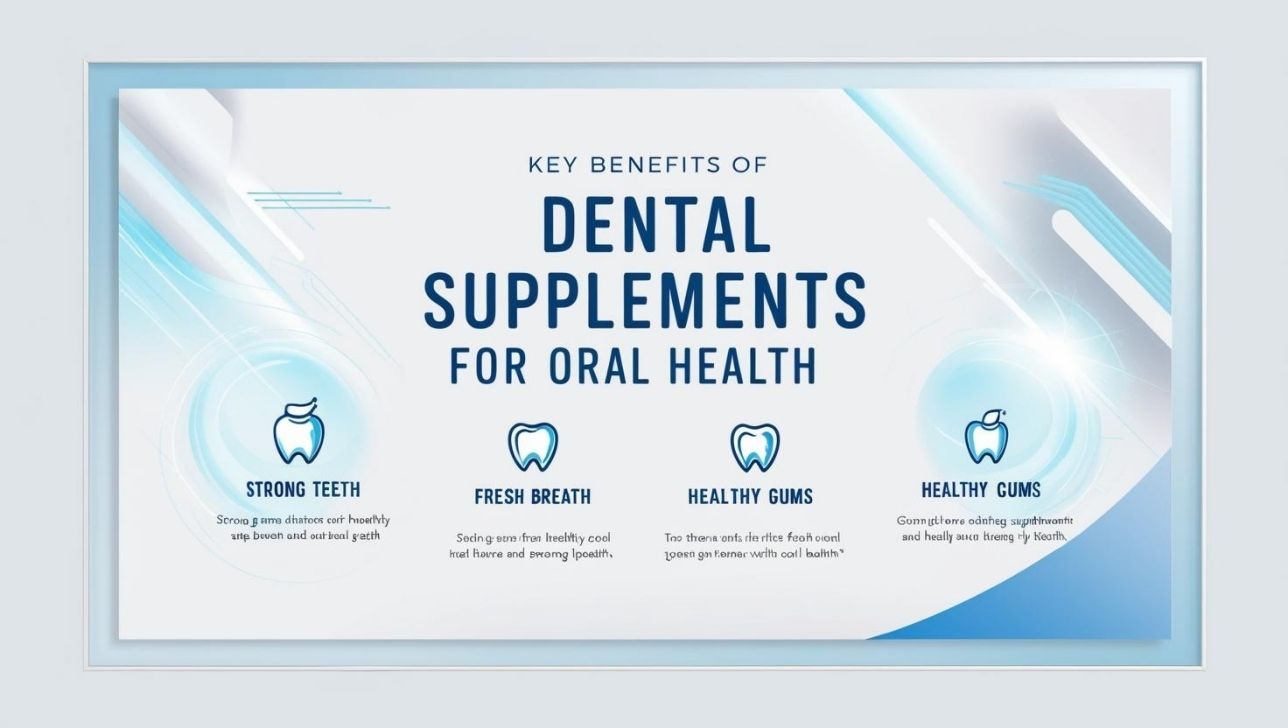Essential Vitamins and Minerals for Strong Teeth and Gums
When it comes to maintaining strong teeth and healthy gums, what you eat and the supplements you take play a crucial role. A balanced diet rich in essential vitamins and minerals can significantly contribute to oral health. Here’s a comprehensive guide to help you understand which nutrients are vital for your teeth and gums.
Still unsure? Read real customer reviews before you decide!
To start, let’s dive into the key vitamins and minerals that support oral health:
Calcium
Role: Calcium is fundamental for building strong teeth and bones. It helps in the formation of tooth enamel, which is the hard outer layer that protects your teeth from decay. Without enough calcium, your teeth can become weak and prone to damage.
Sources: Dairy products like milk, cheese, and yogurt; leafy green vegetables such as spinach and kale; almonds; and fortified foods like cereal and orange juice.
Vitamin D
Role: Vitamin D is essential because it helps your body absorb calcium. It also plays a role in immune function and inflammation control, both of which are important for gum health. Without sufficient vitamin D, even if you consume plenty of calcium, your body may not be able to utilize it effectively.
Sources: Fatty fish like salmon and tuna; egg yolks; mushrooms exposed to sunlight; and fortified foods such as milk, orange juice, and cereals.
Magnesium
Role: Magnesium works alongside calcium to build strong teeth and bones. It also supports the function of vitamin D, enhancing its effectiveness. Magnesium is crucial for the integrity of tooth enamel and the prevention of cavities.
Sources: Nuts and seeds like almonds, cashews, and pumpkin seeds; dark leafy greens like spinach and Swiss chard; whole grains; and legumes.
Vitamin C
Role: Vitamin C is vital for the health of the blood vessels and connective tissues that support your teeth and gums. It promotes collagen production, which is necessary for the strength and elasticity of these tissues. A deficiency in vitamin C can lead to weakened gums and increased risk of periodontal disease.
Sources: Citrus fruits like oranges, lemons, and grapefruits; strawberries; bell peppers; broccoli; and Brussels sprouts.
Vitamin K2
Role: Vitamin K2 is less commonly discussed but equally important for oral health. It helps direct calcium to where it’s needed most—your teeth and bones—rather than allowing it to accumulate in arteries or soft tissues. This vitamin is essential for preventing calcification in the arteries and promoting bone density.
Sources: Fermented foods like natto (a fermented soybean dish), cheese, and egg yolks. Grass-fed butter and ghee are also good sources.
Zinc
Role: Zinc is a trace mineral that helps fight bacteria and prevent plaque buildup. It supports the immune system and aids in wound healing, making it crucial for maintaining gum health. Zinc also plays a role in the formation of saliva, which is important for washing away food particles and neutralizing acids.
Sources: Red meat, poultry, seafood (especially oysters), beans, nuts, and dairy products.
Phosphorus
Role: Phosphorus is another mineral that works with calcium to build strong teeth and bones. It is particularly important for the development of tooth enamel. Phosphorus also helps in the maintenance of acid-base balance in the mouth, which is essential for overall oral health.
Sources: Foods high in protein like meat, poultry, fish, eggs, and dairy products; legumes; and nuts.
B-Vitamins
Role: B-vitamins, particularly B2, B6, and B12, are essential for maintaining healthy gums and preventing inflammation. They help in the metabolism of proteins, fats, and carbohydrates, providing energy to cells and supporting tissue repair.
Sources: Whole grains, lean meats, fish, poultry, eggs, dairy products, and leafy green vegetables.
Fluoride
Role: Fluoride is known for its ability to strengthen tooth enamel and prevent tooth decay. It works by remineralizing the enamel, repairing early signs of tooth decay before they become visible. Fluoride is often added to public water supplies and toothpaste.
Sources: Tap water in areas with fluoridated water; fluoride toothpaste and mouth rinses; and some seafood and tea.
| Nutrient | Role | Primary Sources |
|---|---|---|
| Calcium | Builds strong teeth and bones | Dairy products, leafy greens, almonds, fortified foods |
| Vitamin D | Aids in calcium absorption | Fatty fish, egg yolks, mushrooms, fortified foods |
| Magnesium | Supports calcium function | Nuts, seeds, leafy greens, whole grains |
| Vitamin C | Promotes gum health | Citrus fruits, berries, bell peppers, broccoli |
| Vitamin K2 | Directs calcium to teeth and bones | Fermented foods, grass-fed dairy, egg yolks |
| Zinc | Fights bacteria, prevents plaque buildup | Red meat, poultry, seafood, beans, nuts |
| Phosphorus | Works with calcium to build strong teeth | Protein-rich foods, legumes, nuts |
| B-Vitamins | Prevent gum inflammation | Whole grains, lean meats, fish, dairy |
| Fluoride | Strengthens tooth enamel | Fluoridated water, toothpaste, seafood, tea |
By incorporating these essential vitamins and minerals into your daily diet, you can significantly enhance your oral health. Remember, a balanced diet is just one part of maintaining strong teeth and healthy gums. Regular dental check-ups and proper oral hygiene practices are also crucial for overall oral health.
How to Choose the Right Dental Supplement for Your Oral Health Needs
When it comes to maintaining good oral health, brushing and flossing are just the beginning. dental supplements into your routine can provide additional support for strong teeth and healthy gums. But with so many options available, how do you choose the right one? This guide will help you navigate the world of dental supplements and find the best fit for your needs.
Understanding Your Oral Health Needs
Before diving into the different types of dental supplements, it’s important to understand your specific oral health requirements. Factors like age, diet, medical conditions, and current oral health status play a significant role in determining which supplements will be most beneficial. For instance, if you consume a lot of sugary foods, you might need more vitamin C to combat potential damage. If you have gum disease, supplements that support gum health could be particularly helpful.
Key Nutrients for Oral Health
Several nutrients are crucial for maintaining oral health:
- Vitamin C: Essential for collagen production, which supports gum health.
- Vitamin D: Helps in calcium absorption, crucial for strong teeth.
- Calcium: Strengthens tooth enamel and bones.
- Magnesium: Supports bone density and helps in calcium absorption.
- Zinc: Promotes wound healing and fights bacteria.
- Folic Acid: Important for cell growth and repair, especially useful for gum health.
Evaluating Dental Supplements
When selecting a dental supplement, consider the following criteria:
- Ingredients: Look for supplements that contain the key nutrients mentioned above. Avoid those with unnecessary additives or fillers.
- Quality Certifications: Opt for products that have been certified by reputable organizations like the USP (U.S. Pharmacopeia) or NSF International.
- Dosage: Ensure the supplement provides the recommended daily intake of each nutrient. Too much of certain vitamins, like vitamin A, can be harmful.
- Brand Reputation: Research the brand’s history and customer reviews to ensure reliability and effectiveness.
Top Dental Supplements on the Market
| Product Name | Key Ingredients | Pros | Cons |
|---|---|---|---|
| DentaCure | Vitamin C, Vitamin D, Calcium, Magnesium, Zinc | Comprehensive blend, easy to swallow capsules | Slightly higher price point |
| GumGlow | Vitamin C, Folic Acid, Zinc | Focused on gum health, affordable | Limited to specific nutrients |
| OralGuard | Vitamin D, Calcium, Magnesium | Strengthens tooth enamel, chewable tablets | No additional vitamins beyond bone support |
| ToothStrong | Vitamin C, Zinc, Folic Acid | Broad spectrum, vegetarian-friendly | Some users report mild stomach upset |
Consultation with a Professional
While it’s great to do your own research, consulting with a dentist or a healthcare provider is essential. They can provide personalized advice based on your specific oral health needs and any existing conditions. This step ensures that you’re not only addressing immediate concerns but also preventing future issues.
Combining Supplements with Other Practices
Supplements are just one piece of the puzzle. Combining them with regular dental care practices such as brushing twice a day, flossing daily, and visiting your dentist regularly can significantly enhance your oral health. Additionally, maintaining a balanced diet rich in fruits, vegetables, and lean proteins can provide natural sources of the nutrients you need.
Final Thoughts
Choosing the right dental supplement involves understanding your personal needs, evaluating the product quality, and seeking professional advice. By taking these steps, you can find the perfect supplement to complement your oral hygiene routine and promote lasting oral health.
Don’t wait! Start your journey to better oral health today – Order now!
Conclusion
Finding the right dental supplement can significantly boost your oral health by addressing specific deficiencies and supporting overall wellness. Essential vitamins like C, D, and K, along with minerals such as calcium and phosphorus, play crucial roles in maintaining strong teeth and healthy gums. By understanding your individual needs and consulting with a healthcare provider, you can select a supplement tailored to your oral health goals. Remember, while supplements are beneficial, they should complement a balanced diet rich in fruits, vegetables, lean proteins, and whole grains. Regular dental check-ups and a consistent oral hygiene routine remain vital components of a comprehensive approach to oral health. With the right combination of supplements, dietary choices, and professional care, you can achieve and maintain a radiant, healthy smile.


